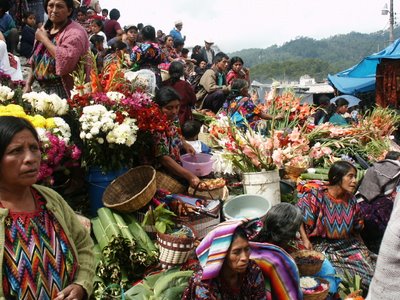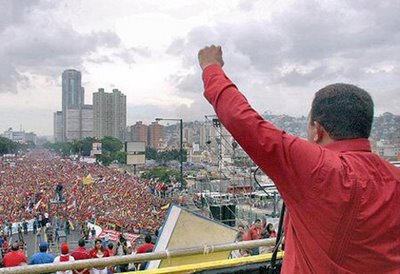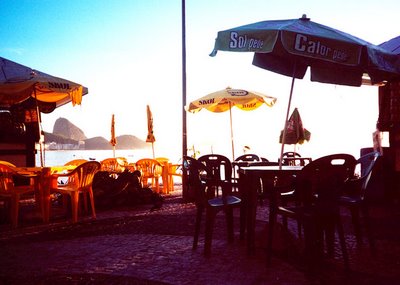Venezuela and Guatemala Stand Down
Venezuela and Guatemala today mutually ceased their efforts to win a coveted seat on the U.N. Security Council. Both have opted to support the selection of a third country—yet to be named. The stand-down is a blessing for the United States, who had been forced by Venezuela's hard drive for a seat to reveal to the world once again that when democracy and profit part ways, America sides with profit. Hugo Chavez had envisioned the seat as a platform from which to espouse his policy of social democracy, and to continue to be a general nuisance to George W. Bush. But the U.S. supported Guatemala for the simple reason that they’d rather have any country occupy the seat than Venezuela.
I lived in Guatemala for two years, and though it is a place I love, it’s also one of the most corrupt and dangerous countries in the world. Presidential approval ratings there are abysmal. The U.S. State Department warns that Guatemala is one of the countries in the world most likely to collapse. The ethnic minority in Guatemala (the Maya, pictured above) are one of the most oppressed in the hemisphere and were victim to ethnic cleansing by a U.S.-backed dictatorship. The U.S. government’s own USAID website explains conditions there best: “Common crime is rampant, and corruption is endemic, fueled by increased money laundering, drug trafficking, and smuggling of illegal aliens.” The site goes on to say: “Unfortunately, the absence of an effective judicial system, the legacies of its civil war, as well as ethnic and social tensions, offer ample kindling for conflict that is increasingly expressed through violent acts such as lynching.”
So if Guatemala is so dysfunctional, yet still enjoyed U.S. backing, Venezuela must be worse, right? Well, that’s what George W. Bush would have you believe, but the simple truth is that U.S. enmity toward Venezuela derives from one fact—president Hugo Chavez is bad for business. He is nationalizing the Venezuelan oil industry and using profits to provide healthcare, education and training for low-income workers. Or more to the point, he is empowering Venezuelan peasants at the expense of rich oil barons. By opposing Chavez the U.S. proved that, while it bleats catchphrases such as freedom and human rights, it doesn’t actually care about them save in the ways that their promotion can generate wealth for U.S. oil interests.
As of this writing, the U.S. still monetarily supports repressive regimes in Egypt, Saudi Arabia, Nigeria, Jordan, and other countries. So clearly, U.S. foreign policy is not driven by a moral mandate to promote democracy worldwide. In fact, they actively oppose democracy any time it suits them. In 2002 Chavez survived a coup attempt which he accused the United States of orchestrating. The evidence he cites is mostly hearsay, however it wouldn’t be the first (or even tenth) overthrow the U.S. arranged, and some believe George W. Bush tipped the American hand when, in the face of international condemnation of the coup, he actually extended diplomatic recognition to the illegal government. The gasp of incredulity in diplomatic circles was audible worldwide. What audacity. The number of world countries, besides the United States, that recognized the illegal government was zero. That’s right—none. The U.S. hoped its stamp of approval would carry enough weight to stabilize the new government, but it didn’t work—the new rulership was immediately toppled and Chavez was restored to power.
Since Chavez himself led an abortive coup some years back, the failure of the 2002 attempt against him might strike those of a Buddhist bent as karmic. I say it’s simply ironic. And now Chavez probably realizes it isn’t so much fun to be on the recieving end of one. But coups aside, Chavez has won the presidency of Venezuela in open elections, not once, but twice. So when U.S. officials describe him as a dictator, they are simply lying. They lie because branding a foreign leader a dictator is their trump card; Americans automatically hate the figure in question without actually finding out the truth for themselves. This sort of willful ignorance contributes to the worldwide reputation of Americans as pious, uninformed loudmouths, and it also makes it easier for the denizens of the White House to flout international law. So, for the record, here are the hard and undisputable numbers on Hugo Chavez:
In a poll by IAVD (Venezuelan Institute for Data Analysis) conducted in March, 82.7% of the Venezuelan population looked favorably upon the job done by President Hugo Chavez. The percentages break down thus: 22.9% said he had done a regular to good job; 41.8% good; 18.4% excellent; 5.7% regular to bad; 5.5% bad; and 4.6% terrible. The same poll declared that 61.6% of those surveyed did not know who should be the primary opposition candidate in the upcoming December 3 presidential election. However, Julio Borges, from the Primero Justicia party, received 8.9% of votes, the highest of all opposition candidates. In response to broader questions, 58.8% of Venezuelans said that they believe the country is better off today because of the Chavez administration.

Results from another poll conducted by Consultores 21 differ from the IAVD results. 62% of those surveyed were favorable of the job done by the President, while approximately 38% were not. The difference in numbers between the two polls lies mainly in how the questions were framed. While IAVD grouped those who thought Chavez was doing a “regular” job with the favorable group, the second poll winnows out these basically nonplussed respondents by asking for explicit approval of Chavez, rather than merely a lukewarm response. But in either case, Chavez’s poll numbers are high (George W. Bush’s approval rating is 35%, and that’s low no matter how the questions are framed).
In case you’re wondering about the integrity of the political process in Venezuela, the August 2004 recall election was certified as fair and open by both the Carter Center and the Organization of American States, and in it, Chavez was reconfirmed with 59% of the vote (Bush won 51.7% of votes in the 2004 U.S. election). In electoral terms, 59% of the vote is a landslide. Since it’s clear that Chavez is a democratically elected and unusually popular ruler, it becomes obvious what is really the source of tension between the United States and Venezuela. That’s right—it’s another fight over oil. Venezuela is the world’s fifth largest oil producer, and a major supplier to the U.S. But Washington doesn’t like its oil (which somehow ended up under Venezuela instead of under the District of Columbia, where it belongs) in the hands of a man who is openly critical of American policy. Add to that the fact that George W. Bush’s oil baron poker buddies are profiting millions fewer dollars since nationalization required a renegotiation of their fat contracts, and it’s easy to see why ousting Chavez is an important U.S. goal.
But U.S. aims are at odds with the needs of poor indigenous people. And increasingly, the U.S. definition of freedom seems to be the freedom to work in a Nike sweatshop. Chavez’s unforgivable sin is that of giving a bunch of uppity brown peasants hope that they can rise above a U.S.-dictated economic ceiling. And it’s an idea that is catching on in other parts of Latin America, notably Bolivia, where Chavez disciple Evo Morales won power in yet another legitimate election. Hugo Chavez is no saint, and there is plenty of opportunity for him to go rotten—only time will tell. But in the meantime perhaps those buzzwords you hear Bush directing toward him—dictatorship, human rights, free market, oppressive regime—are an attempt to disguise the White House's real aim of generating more American oil profit.
.























0 Comments:
Post a Comment
<< Home